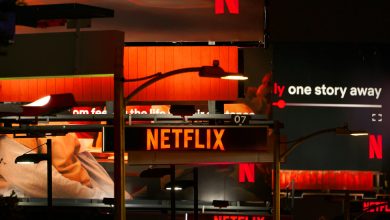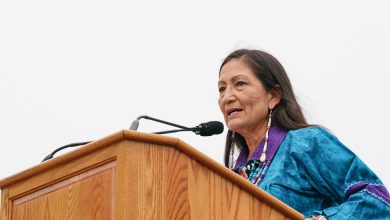On TV, the Truth Hurts

As seen on the news, real life right now is heartbreaking, terrifying, depressing and exhausting. But as entertainment? Real life is hot, hot, hot, baby!
The first few months of 2022 in TV have been a nonstop pageant of ripped-from-reality series. That juicy magazine feature you read a few years ago? It’s a show now: “Pam & Tommy” (based on a Rolling Stone article), “The Girl from Plainville” (Esquire), “Inventing Anna” (New York). We’ve gotten three series about disgraced tech moguls, based on a book and two podcasts. We’re getting the Julia Roberts Watergate story, “Gaslit,” based on another podcast. “The Thing About Pam,” based on a “Dateline” investigation. “Joe vs. Carole,” based on — no, not the Netflix “Tiger King” docu-series you’re thinking of but the “Tiger King” podcast you may have binged after you watched it.
These series, unlike the sweeps specials and cheapo docudramas of old, are generally well polished. There is an almost embarrassing amount of creative and acting talent thrown at them. And they’re good at getting talked about because they focus on the kinds of personalities and scandals that people love to talk about.
But what makes them reliable — they’re stories audiences are already interested in, because they’ve been told before — makes it hard for them to be more than digestible versions of things that already exist, the video equivalent of audiobooks. Truth may be buzzier than fiction right now, but that doesn’t mean it’s as interesting.
Imitation, Not Invention
Why are there so many of these stories now, produced so lavishly? Maybe because drama has been competing for cultural space with nonfiction and documentary for years now, and often losing.
In 2015, the true-crime documentaries “The Jinx,” on HBO, and “Making a Murderer,” on Netflix, dominated the conversation about TV and, like the first season of the podcast “Serial,” made actual news. Thence followed a torrent of conversation-dominating true-crime sagas and scammer tell-alls: “Wild Wild Country,” “McMillions,” two Fyre Festival documentaries at once, two Nxivm series and counting.
Meanwhile, scripted TV is in a curious place. There are so many platforms, needing so much material, that there is theoretically more room than ever for innovation. But the abundance of content also makes TV timid. The surest way to get people’s attention amid all the clutter is with a twist on something familiar.
In one sector of TV, that means intellectual-property brand extensions from Marvel, Star Wars and the ’90s sitcom catalog. In another, it means retelling recently-told nonfiction stories. Two audiences, one principle: The umpteenth multipart saga of a recently notorious tech mogul is “The Book of Boba Fett” for the high-gloss limited-series fan.
Instead of the imaginative flights of original fiction, these series offer big, showy performances, built around eccentric, flamboyant figures. (There are exceptions, like Hulu’s glum and reserved “Dopesick.”) Instead of invention, they deliver imitation. They’re rich with accents, tics and prosthetics. Stars are transformed into uncanny, Madame Tussaudian replicas in “Impeachment,” “Pam & Tommy” and, coming later this month, “Gaslit,” in which Sean Penn, as the Nixon aide John N. Mitchell, is buried under enough rubbery jowls to make at least half a Jabba the Hutt.
The Fake Heiress Who Conned New York’s Wealthy
Anna Sorokin was found guilty of theft of services and grand larceny in 2019. She now faces deportation to Germany for overstaying her visa.
- A Serial Scammer: Ms. Sorokin, a Russian immigrant, pretended to be a German heiress, swindling New York’s elite out of more than $200,000.
- (Con) Artist: “Free Anna Delvey,” Ms. Sorokin’s first group gallery exhibition, features reproductions of drawings she made while incarcerated. Here is what she said about her art making process.
- ‘Inventing Anna’: The mini-series by Shonda Rhimes works as a clichéd morality tale but stumbles as a piece of storytelling, writes our critic.
- Fiction vs. Reality: A reporter who covered Ms. Sorokin’s trial in 2019 for The Times explains what the series gets right (and wrong).
Peacock’s “Joe vs. Carole” uses the gifts of John Cameron Mitchell and Kate McKinnon to turn Joe Exotic and Carole Baskin into even tawdrier cartoons than they were in the rubbernecking Netflix series. In NBC’s bizarre true-crime tale “The Thing About Pam,” Renée Zellweger gives a portrayal that aims for “Fargo”-esque dark comedy but lands closer to an “S.N.L.” sketch.
Occasionally, the caricature is so transcendently over the top as to become art in itself, like Julia Garner’s otherworldly interpretation of the Euroscammer Anna Delvey in “Inventing Anna.” The series itself drags, and I have no idea if it is an accurate or responsible rendering of reality. (It begins with the declaration that it is a true story, “except for the parts that are totally made up.”) I know only that — much as with Poochie on “The Simpsons” — whenever anyone but Anna was onscreen, I would restlessly wonder where Anna was.
But the dazzle of these performances often hides question marks at the core, as in the season’s accidental trilogy of tech-hustler series. In Apple TV+’s “WeCrashed,” Jared Leto Letos it up as the WeWork founder Adam Neumann, with a manic intensity and an accent somewhere between Triumph the Insult Comic Dog and Gru from “Despicable Me.” But there’s no real idea of the character beyond an overweening shamelessness.
Likewise, in Showtime’s “Super Pumped: The Battle for Uber” (based on a book by the New York Times reporter Mike Isaac), Joseph Gordon-Levitt is nothing if not all-in as the ride-share entrepreneur Travis Kalanick. But the series, with its head-thrashing soundtrack and video-game visuals, is all sound and alpha fury. It doesn’t really develop its focal character beyond the way he describes himself in the pilot — as (to use a milder term) a jerk — and he behaves in any situation the way you’d think a jerk would.
In the best of the three tech series, Hulu’s “The Dropout,” Amanda Seyfried is spectacular as Elizabeth Holmes, the young biotech entrepreneur who claimed that her start-up, Theranos, could perform a battery of tests on a single drop of blood. It’s an urgent, feral performance, imagining Holmes as a bundle of mania and green juice, dancing off her nerves in private, hiding her flop sweat behind a husky voice and a Steve Jobs turtleneck.
The story — how Holmes lured in old, dumb money, the bloody Potemkin machinations behind Theranos’s fake technology — is jaw-dropping, and the producer Liz Meriwether (“New Girl”) tells it with flash and dark humor. But that story has already been widely told in news reports, a book, an HBO documentary and the podcast the series was based on. Holmes, meanwhile, remains largely the enigma she starts out as.
Now, it is absolutely true that real life does not always give you neat “Rosebud” explanations; real people are often simply jumbles of unresolved contradictions. But that’s one reason we have drama: to make emotional, if not literal, sense of this kind of figure. (Hence Orson Welles reimagined William Randolph Hearst as Charles Foster Kane.)
When people say “Truth is stranger than fiction,” what they mean is that it is more inexplicable. It’s random; it’s poorly foreshadowed; every character other than ourselves is a black box. This is where, in a story, imagination steps in, not to tie everything into a neat bow but to offer insight. Instead, too many true-life series today feel like the student in a writing workshop justifying a confusing plot turn with “But it really happened!” — a line that implies that literal reality is both fiction’s ultimate defense and its greatest aspiration.
And it’s fair to ask whether most of these series expand on the reportage we already have. Elle Fanning (“The Great”) will likely challenge Seyfried in awards season, as the young woman in “The Girl From Plainville” who prods her boyfriend to kill himself. But the story was already chillingly told in the documentary “I Love You, Now Die,” by Erin Lee Carr.
Adam McKay, who explicated from-real-life stories in his films “The Big Short” and “Vice,” entered the reality derby with his HBO hoops series, “Winning Time: The Rise of the Lakers Dynasty,” based on the book “Showtime” by Jeff Pearlman. I had high hopes for it, largely because of how McKay’s podcast, “Death at the Wing,” used stories about 1980s basketball to make an overarching, righteously furious case about the Reagan era and the war on drugs.
But “Winning Time,” while aggressively entertaining, is hooked on the exhausting style that marked “The Big Short,” full of screen captions, fourth-wall-breaking and ever-changing film stock. It never stops. It is never boring. But it lacks the cohesion and vision of well-conceived fiction. It’s a dunk contest masquerading as a championship series.
A Realism Fetish
None of this is to say that real life can’t be the stuff of great drama. “Mrs. America,” for instance, told a parallel story about the 1970s Equal Rights Amendment movement and its nemesis, Phyllis Schlafly, in the process offering a preview and origin story of the culture wars of today. A few years earlier, “The People v. O.J. Simpson: American Crime Story” recaptured the racial dynamics of its celebrity murder case and reclaimed the prosecutor Marcia Clark as the victim of sexist double standards. (It may not be coincidence that these examples have a few decades’ distance on their subjects.)
Still, there’s a bigger thrill in series that borrow snippets from real stories and run wild with them, like the legal drama “The Good Fight,” which spins nuggets about troll farms and social media into a vision of democracy under cyberattack. The recent season premiere of “Atlanta” turned a true-crime story about an adoptive family into a hallucinatory fable about the racism of the well-intentioned.
But fiction these days is up against a culture that practically fetishizes “it really happened” realism. The distinction between the aims of fiction and nonfiction are so blurred that professors report their students using the term “fiction novel” (what you might know as a “novel”). Cultural journalism has fallen in love with “What [Show or Movie] Gets Right/Wrong About [Person or Event]” fact-checks, the kind of red-pencil criticism that turns art into an A.P. subject test.
What is art actually obligated to “get right”? Not facts but feelings, human nature, its own worldview. Its job is not to tell you things you can look up on Wikipedia; its job is to tell you the thing that you didn’t know, that you didn’t know you wanted to know, that may leave you questioning what “right” is long after you read or watch.
Maybe the best judgment on TV’s true-story addiction is hidden in the kind of comparisons that these series get. The highest compliment you can pay one of these stories, after all, is that it’s like a “real-life” version of “Succession,” or “Silicon Valley,” or “Scandal.” Those fictional series set the standard precisely because they’re free to follow not documentary truth, but the truth of their dark, satirical or outlandish visions.
Does the current glut of shows about scammers speak to our moment? Sure; taken as a group, they have something to say about the perverse, warping incentives of the modern economy. But individually, none is a tenth as surprising or effective on that subject as “Severance,” a sci-fi parable about workers who have their consciousnesses bisected to make them more productive — a premise that isn’t close to literal reality but feels, in execution, profoundly true.
Reality has its virtues. But there ain’t nothing like the fake thing.




